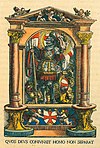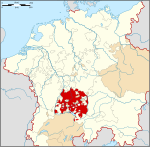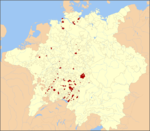world.wikisort.org - Germany
Kaufbeuren (German pronunciation: [kaʊfˈbɔʏʁən]; Bavarian: Kaufbeiren) is an independent town in the Regierungsbezirk of Swabia, Bavaria. The town is an enclave within the district of Ostallgäu.
Kaufbeuren | |
|---|---|
Town | |
 Town hall | |
 Flag  Coat of arms | |
Location of Kaufbeuren  | |
 Kaufbeuren  Kaufbeuren | |
| Coordinates: 47°52′48″N 10°37′21″E | |
| Country | Germany |
| State | Bavaria |
| Admin. region | Swabia |
| District | Urban district |
| Subdivisions | 5 districts |
| Government | |
| • Lord mayor (2020–26) | Stefan Bosse[1] (CSU) |
| Area | |
| • Total | 40.02 km2 (15.45 sq mi) |
| Highest elevation | 860 m (2,820 ft) |
| Lowest elevation | 681 m (2,234 ft) |
| Population (2020-12-31)[2] | |
| • Total | 44,662 |
| • Density | 1,100/km2 (2,900/sq mi) |
| Time zone | UTC+01:00 (CET) |
| • Summer (DST) | UTC+02:00 (CEST) |
| Postal codes | 87571–87600 |
| Dialling codes | 08341 |
| Vehicle registration | KF |
| Website | www.kaufbeuren.de |
Districts
Kaufbeuren consists of nine districts:
- Kaufbeuren (town core incl. historical town)
- Kaufbeuren-Neugablonz
- Oberbeuren
- Hirschzell
- Kleinkemnat
- Großkemnat
- Märzisried
- Ölmühlhang
- Sankt Cosmas
Mayors
Stefan Bosse (CSU) is the Lord Mayor of Kaufbeuren since November 2004. He was reelected in March 2014 with 57.48% of the votes[3] and again in March 2020 with 54.5% of the votes.[4]
Landmarks
- Town hall (built 1879–1881)
- Crescentiakloster (founded 1150)
- Historical town with partially conserved historical town wall
- St.-Martins-Kirche
- Fünfknopfturm (Five-Button-Tower)
- St.-Blasius-Kirche
- Hexenturm
- Gerberturm
- Pulverturm
- Münzturm
- Sywollenturm
- Zollhäuschen
- Stadttheater Kaufbeuren
- Kunsthaus Kaufbeuren
Museums
- Stadtmuseum
- Feuerwehrmuseum
- Puppentheater-Museum
- Isergebirgs-Museum (Neugablonz)
Notable people


- Maria Crescentia Höss (1682–1744), nun, beatified 1900, canonised 2001
- Sophie von La Roche (1730–1807), writer
- Ludwig Ganghofer (1855–1920), writer
- Rudolf Roessler (1897–1958), publisher and spy
- Wilhelm Walcher (1910–2005), physicist
- Hans Liebherr (1915–1993), master mason, inventor of the mobile tower crane and founder of the Liebherr
- Hans Magnus Enzensberger (born 1929), poet, writer and publisher
- Walter Riester (born 1943), politician (SPD), Secretary of State for Employment 1998–2002
- Erich Weishaupt (born 1952), ice hockey player
- Dieter Hegen (born 1962), ice hockey player
- Alexander Sulzer (born 1984), ice hockey player
Kaufbeuren Air Base
The Kaufbeuren Air Base was established as a Luftwaffe station in 1935. When seized by the United States Army in May 1945 at the end of World War II it was discovered to be the final location of Nazi Party's top secret FA signals intelligence and cryptanalytic agency.[5] After serving as a U.S. airbase during the post-war period, the field was ultimately returned to the town, and today serves as a German Air Force training field.
Culture
The Tänzelfest is a festival, which takes place usually at the end of June. Children reenact the history of the town in traditional costume.[6] There are a lot of events at this time.
Sports
The town is known for their ice hockey team ESV Kaufbeuren. They currently play in DEL2, the second level of ice hockey in Germany.
Twin towns – sister cities
Kaufbeuren is twinned with:[7]
 Ferrara, Italy (1991)
Ferrara, Italy (1991) Szombathely, Hungary (1992)
Szombathely, Hungary (1992) Jablonec nad Nisou, Czech Republic (2009)
Jablonec nad Nisou, Czech Republic (2009)
References
- Liste der Oberbürgermeister in den kreisfreien Städten, Bayerisches Landesamt für Statistik, accessed 19 July 2021.
- "Tabellenblatt "Daten 2", Statistischer Bericht A1200C 202041 Einwohnerzahlen der Gemeinden, Kreise und Regierungsbezirke". Bayerisches Landesamt für Statistik (in German). June 2021.
- Amtsinhaber Stefan Bosse als Kaufbeurer OB mit absoluter Mehrheit wiedergewählt, accessed May 14, 2014
- Alter und neuer Oberbürgermeiser in Kaufbeuren: Stefan Bosse (CSU) wiedergewählt, accessed May 9, 2020
- "FA (Nazi Party) - TICOM Archive".
- "Germany Bavaria Events Tänzelfest Kaufbeuren". Archived from the original on 2011-11-01.
- "Städtepartnerschaften". kaufbeuren.de (in German). Kaufbeuren. Retrieved 2021-02-15.
External links
- . Encyclopædia Britannica. Vol. 15 (11th ed.). 1911.
- Official website
 (in German)
(in German) - kunsthaus kaufbeuren
- Stadtmuseum Kaufbeuren
- Tänzelfest in Kaufbeuren
- The history of Kaufbeuren
На других языках
- [en] Kaufbeuren
[es] Kaufbeuren
Kaufbeuren es una ciudad independiente en la región de Suabia, en el sur del Estado de Baviera (Alemania). La ciudad está completamente rodeada por el distrito de Algovia oriental (Ostallgäu).[ru] Кауфбойрен
Кауфбойрен (нем. Kaufbeuren) — город земельного подчинения в Германии, в юго-западной части земли Бавария.Другой контент может иметь иную лицензию. Перед использованием материалов сайта WikiSort.org внимательно изучите правила лицензирования конкретных элементов наполнения сайта.
WikiSort.org - проект по пересортировке и дополнению контента Википедии



